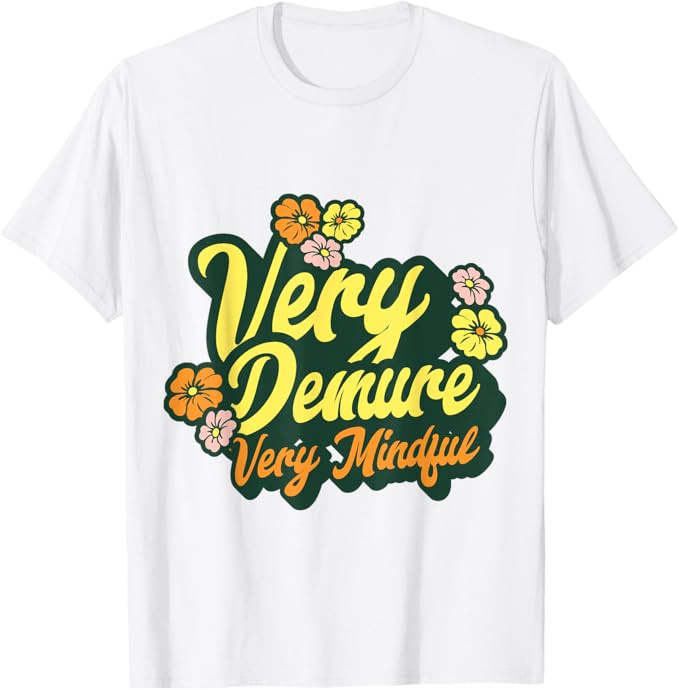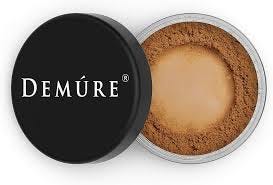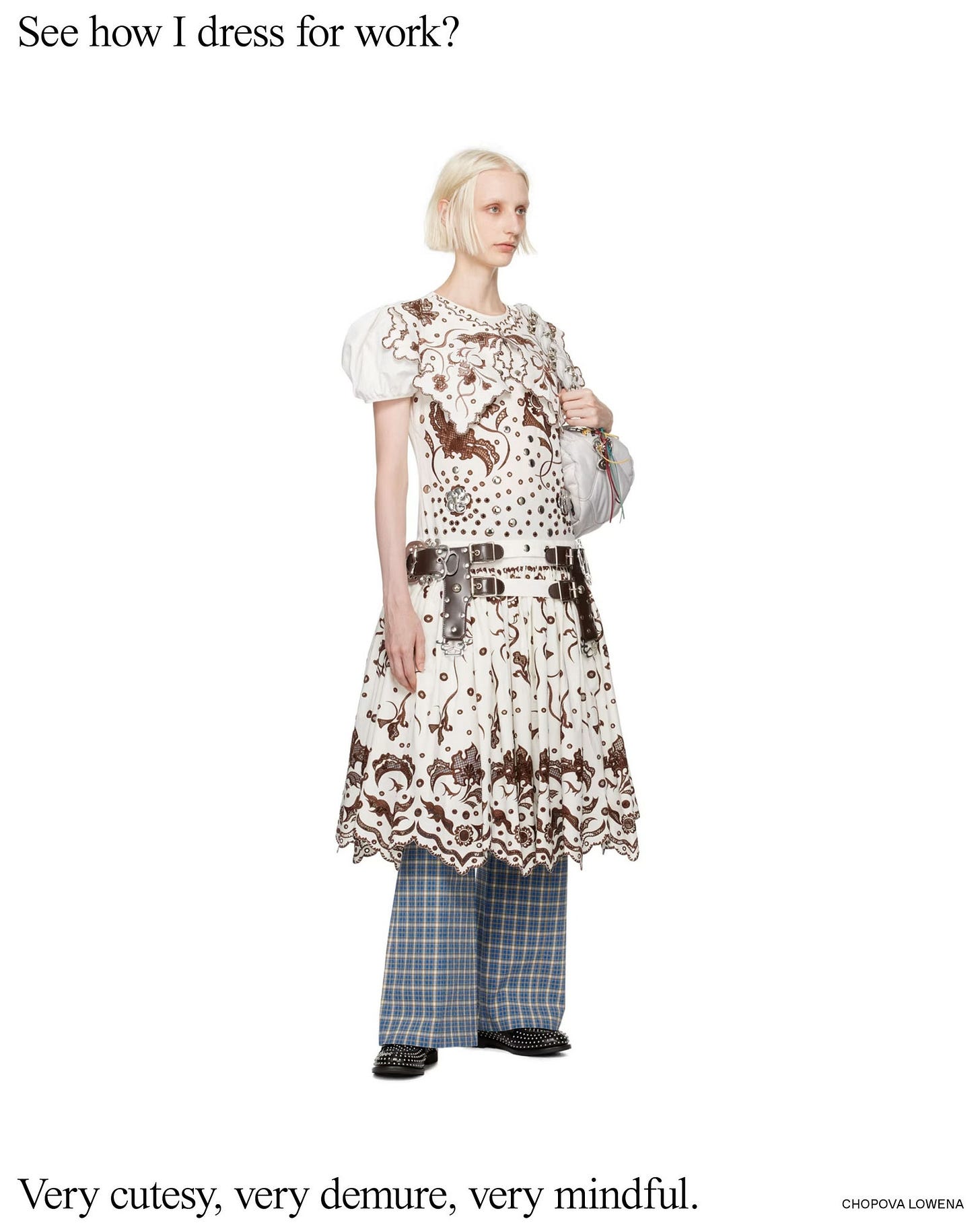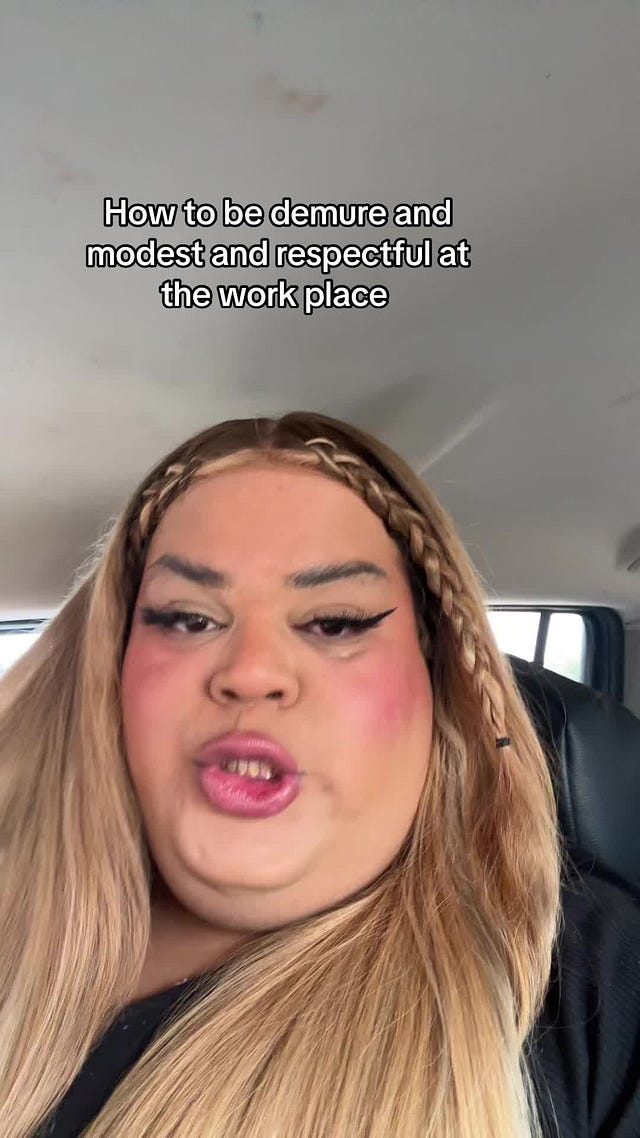Note to readers: This post may be too long for your email inbox. Your options: A) Click on the headline to read it in your browser or B) find it on the Substack app.
Until very recently, if we’d played word-association with demure, you might have pictured something like this:
Demure has long signified coy and bashful and a slew of other maidenly synonyms: modest, unassuming, meek, mild, reserved, retiring, pure, innocent, seemly, ladylike.
So what did it mean when “beauty influencer”1 Jools Lebron, a trans woman, took to TikTok on August 2 to earnestly describe her, um, lavish workplace look as “very demure, very mindful”?
 Tiktok failed to load.
Tiktok failed to load.Enable 3rd party cookies or use another browser
It was a joke, of course. (And Lebron is “laughing all the way to the bank,” wrote The Cut’s Olivia Craighead. Although it’s not clear to me how TikTok virality converts to cash, Lebron says she’s now able to finance her gender transition.) Lebron “wields the phrase satirically, using the bit to joke about the performance of femininity,” observed Alaina Demopoulos in The Guardian. The satire is even more obviously over the top in Jools’s video about “how to be demure when you’re hung over and have to go to the CVS”: “My spray tan blotching off? Very demure. I have Taco Bell refried beans stuck in my hair. I’m very cutesy with it.”
During the three weeks after Lebron posted her original video demure detonated. There were overnight explainers — on TikTok, naturally, but also in traditional media. “Goodbye, Brat Summer! Hello, Demure Fall! ” trilled a headline on the Allure website.2 The New York Times took the NYT approach, convening members of its Style Desk for a roundtable discussion (gift link). “When was the last time any of you used the word ‘demure’ before this past week?” one Styleista pondered. “It feels so old-timey.”
Demure feels “old-timey” because it’s an old word, and that old-timeyness may explain why it’s so catchy. A different word — say, classy or proper — wouldn’t have done the trick: It wouldn’t have sounded the right tone of absurdity and fustiness.
As language maven John Kelly wrote last week, we’ve been using demure since the 1300s, “a time when our language was borrowing a great many words from the Norman French.” From its original sense of “calm” or “settled” it came to signify both “reserved” and “exhibiting a quality of affected or performed modesty” — emphasis on “affected.”
We get demure from French, but from which French source? That’s unclear. John writes that it may come from Old French meur, which could mean “mature, ripe, serious, grave, discreet, considered, settled.” As for this de- prefix, “English, apparently, may have just added that. (Not very demure.)” Alternatively, demure (pronounced de-MYOOR) may be related to demur (pronounced de-MURR), whose verb form means “to object, to show reluctance” and which came into English from French demorer, “to delay or hinder.” (Demur can also be a noun that means “hesitation” or “protest.”)
The word-origins story is interesting, but I’ve been even more interested to watch the demure meme propagate across the internet and into brand marketing.
Here, for example, is UnderTheDeskNews’s “Kamala Cut,” which layers Jools Lebron’s original script under contrasting images of Vice President Harris and her Republican opponents.
On Instagram, the Los Angeles Public Library engaged its employees to demonstrate demure library behavior. The library should have consulted one of its many dictionaries to check the spelling of “demure.” (Click through to see the whole reel.)
There was overnight “demure” merch. (Demurch on demand?)

Long before the current demure trend, demure appeared in brand names. The U.S. trademark database reveals two lapsed registrations for DEMURE douche, one belonging to Richardson-Vicks, Inc. (1951-1983), a Connecticut company; and the other to St. Ives Laboratories, Inc. (1983-1991), in California. Was it the same product under different ownership? Alas, I was unable to find out.
There may have been a third DEMURE douche, or a third corporate owner of the same brand name: This undated ad includes a coupon addressed to “Roycemore, Inc.,” in Illinois, a company I’ve been unable to track down.

There are additional expired trademarks for DEMURE hair coloring, curtains, and Scott toilet paper. A Florida company, Deluvia, owns current trademarks for a brand it calls DEMÚRE. The acute accent? Very Frenchy. Very cutesy. Very pointless.

Meanwhile, brands not called DEMURE have scrambled to associate themselves with the old-timey, newly relevant word. Madeleine Schulz provided a roundup for Vogue Business3:
Ssense posted a Chopova Lowena-clad model looking very mellow: “See how I dress for work? Very cutesy, very demure, very mindful.” Tanner Fletcher debuted their new lace trimmed jorts with: “Your jorts aren’t demure enough, so we added lace trim”. Anthropologie posted a ‘very demure’ office vibes TikTok. Patrick Ta Beauty is “very classy, very cutesy, very demure”, the founder told viewers of People writer Alyssa Brascia’s TikTok. Maybelline posted a “Maybe it’s very demure, maybe it’s Maybelline” TikTok, while Nars asked: “Why be demure when you can be Explicit?” in reference to its Explicit lipstick line.

Schulz quotes a marketing strategist who warns brands that “[i]n the land of internet humour, there is a fine line between cultural relevance and cringe.” (No kidding.) Demure, says this strategist, “is dripping in irony and satire. If your brand doesn’t embody these qualities, or is simply not a humorous brand, then jumping on the trend won’t land and could even read as mockery.”
You could, in other words, just end up looking douchey.
I can never write “influencer” without quotation marks, just as I can never not qualify “reality TV” with irony-quotes.
Have you already forgotten about “brat”? Here’s a refresher.










So much to savor here, Nancy! But I think my favorite is your #motleycore coinage, whose example was clearly inspired by my second grade wardrobe’s theme of pairing random dresses with random pants.
+1 to "motleycore". And I'm not even a fashion guy.